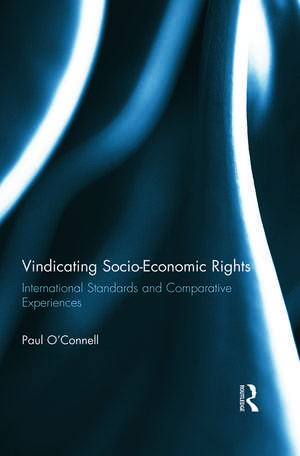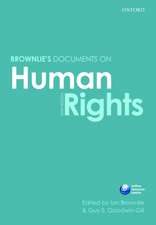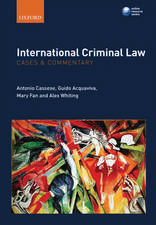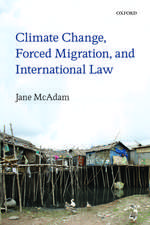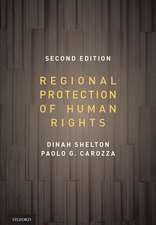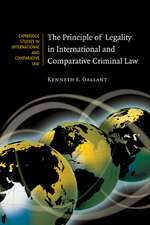Vindicating Socio-Economic Rights: International Standards and Comparative Experiences: Routledge Research in Human Rights Law
Autor Paul O'Connellen Limba Engleză Paperback – 29 oct 2013
This study, drawing on comparative experiences in a number of jurisdictions which have addressed (in some cases more explicitly than others) the issue of socio-economic rights, seeks to counter this argument by showing that courts can play a substantial role in the vindication of socio-economic rights, while still respecting the relative institutional prerogatives of the elected branches of government. Drawing lessons from experiences in South Africa, India, Canada and Ireland, this study seeks to articulate a "model adjudicative framework" for the protection of socio-economic rights. In this context the overarching concern is to find some role for the courts in vindicating socio-economic rights, while also recognising the importance of the separation of powers and the primary role that the elected branches of government must play in protecting and vindicating such rights. The text incorporates discussion of the likely impact and significance of the Optional Protocol to the International Covenant on Economic, Social and Cultural Rights, and looks at the implications of the Mazibuko decision for the development of South Africa’s socio-economic rights jurisprudence.
| Toate formatele și edițiile | Preț | Express |
|---|---|---|
| Paperback (1) | 369.73 lei 6-8 săpt. | |
| Taylor & Francis – 29 oct 2013 | 369.73 lei 6-8 săpt. | |
| Hardback (1) | 1060.52 lei 6-8 săpt. | |
| Taylor & Francis – 21 feb 2012 | 1060.52 lei 6-8 săpt. |
Din seria Routledge Research in Human Rights Law
-
 Preț: 327.10 lei
Preț: 327.10 lei -
 Preț: 326.49 lei
Preț: 326.49 lei -
 Preț: 311.18 lei
Preț: 311.18 lei -
 Preț: 309.90 lei
Preț: 309.90 lei - 9%
 Preț: 936.56 lei
Preț: 936.56 lei -
 Preț: 328.25 lei
Preț: 328.25 lei - 8%
 Preț: 388.56 lei
Preț: 388.56 lei -
 Preț: 384.91 lei
Preț: 384.91 lei -
 Preț: 386.21 lei
Preț: 386.21 lei -
 Preț: 312.02 lei
Preț: 312.02 lei -
 Preț: 311.41 lei
Preț: 311.41 lei - 20%
 Preț: 268.89 lei
Preț: 268.89 lei -
 Preț: 281.27 lei
Preț: 281.27 lei -
 Preț: 309.46 lei
Preț: 309.46 lei -
 Preț: 341.55 lei
Preț: 341.55 lei - 18%
 Preț: 1167.58 lei
Preț: 1167.58 lei - 18%
 Preț: 1062.98 lei
Preț: 1062.98 lei - 18%
 Preț: 1058.65 lei
Preț: 1058.65 lei - 18%
 Preț: 1056.28 lei
Preț: 1056.28 lei - 26%
 Preț: 822.34 lei
Preț: 822.34 lei - 18%
 Preț: 1172.58 lei
Preț: 1172.58 lei - 25%
 Preț: 823.63 lei
Preț: 823.63 lei -
 Preț: 371.64 lei
Preț: 371.64 lei -
 Preț: 473.88 lei
Preț: 473.88 lei - 18%
 Preț: 1109.99 lei
Preț: 1109.99 lei -
 Preț: 468.36 lei
Preț: 468.36 lei - 18%
 Preț: 1169.97 lei
Preț: 1169.97 lei - 25%
 Preț: 824.17 lei
Preț: 824.17 lei - 18%
 Preț: 1117.88 lei
Preț: 1117.88 lei - 18%
 Preț: 1060.87 lei
Preț: 1060.87 lei - 18%
 Preț: 1061.06 lei
Preț: 1061.06 lei - 18%
 Preț: 1111.58 lei
Preț: 1111.58 lei - 18%
 Preț: 1057.75 lei
Preț: 1057.75 lei - 18%
 Preț: 1109.18 lei
Preț: 1109.18 lei - 18%
 Preț: 1061.57 lei
Preț: 1061.57 lei -
 Preț: 476.08 lei
Preț: 476.08 lei - 26%
 Preț: 847.31 lei
Preț: 847.31 lei - 18%
 Preț: 1059.48 lei
Preț: 1059.48 lei - 18%
 Preț: 1060.52 lei
Preț: 1060.52 lei -
 Preț: 414.32 lei
Preț: 414.32 lei - 18%
 Preț: 1053.92 lei
Preț: 1053.92 lei -
 Preț: 423.30 lei
Preț: 423.30 lei
Preț: 369.73 lei
Nou
Puncte Express: 555
Preț estimativ în valută:
70.75€ • 73.42$ • 59.14£
70.75€ • 73.42$ • 59.14£
Carte tipărită la comandă
Livrare economică 17-31 martie
Preluare comenzi: 021 569.72.76
Specificații
ISBN-13: 9780415730518
ISBN-10: 0415730511
Pagini: 248
Dimensiuni: 156 x 234 x 13 mm
Greutate: 0.45 kg
Ediția:1
Editura: Taylor & Francis
Colecția Routledge
Seria Routledge Research in Human Rights Law
Locul publicării:Oxford, United Kingdom
ISBN-10: 0415730511
Pagini: 248
Dimensiuni: 156 x 234 x 13 mm
Greutate: 0.45 kg
Ediția:1
Editura: Taylor & Francis
Colecția Routledge
Seria Routledge Research in Human Rights Law
Locul publicării:Oxford, United Kingdom
Public țintă
Postgraduate and UndergraduateCuprins
1. Introduction 2. International Standards on Socio-Economic Rights 3. The South African Experience 4. Developing Social Rights in India 5. The Canadian Charter, Substantive Equality and Social Rights 6. The Rejection of Socio-Economic Rights in Ireland 7. A Model Adjudicative Framework 8. Conclusions
Descriere
Notwithstanding the widespread and persistent affirmation of the indivisibility and equal worth of all human rights, socio-economic rights continue to be treated as the Cinderella of the human rights corpus. At a domestic level this has frequently resulted in little appetite for the explicit recognition and judicial enforcement of such rights in constitutional democracies. One of the reasons often given for this is the apprehension that the judicial enforcement of socio-economic rights is fundamentally at variance with the doctrine of the separation of powers.
This book draws on the comparative experiences in a diverse number of jurisdictions, including South Africa, India, Canada, and Ireland, which have addressed the issue of socio-economic rights. In doing so it seeks to show that courts can play a substantial role in the vindication of socio-economic rights, while still respecting the relative institutional prerogatives of the other branches of government. To this end the book sets out a "model" approach which considers the standard of review which courts should, generally, adopt in socio-economic right cases, the optimum remedial approach and also sign-posts some potential problems or shortcomings of this model.
This book draws on the comparative experiences in a diverse number of jurisdictions, including South Africa, India, Canada, and Ireland, which have addressed the issue of socio-economic rights. In doing so it seeks to show that courts can play a substantial role in the vindication of socio-economic rights, while still respecting the relative institutional prerogatives of the other branches of government. To this end the book sets out a "model" approach which considers the standard of review which courts should, generally, adopt in socio-economic right cases, the optimum remedial approach and also sign-posts some potential problems or shortcomings of this model.
